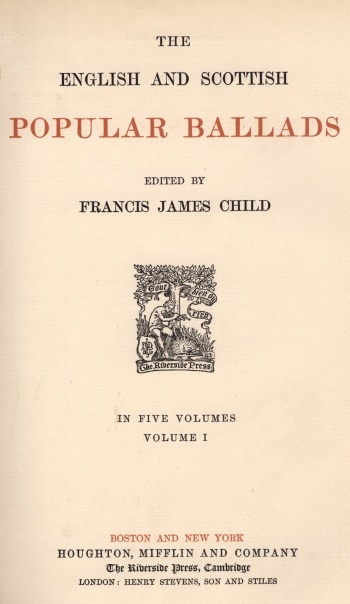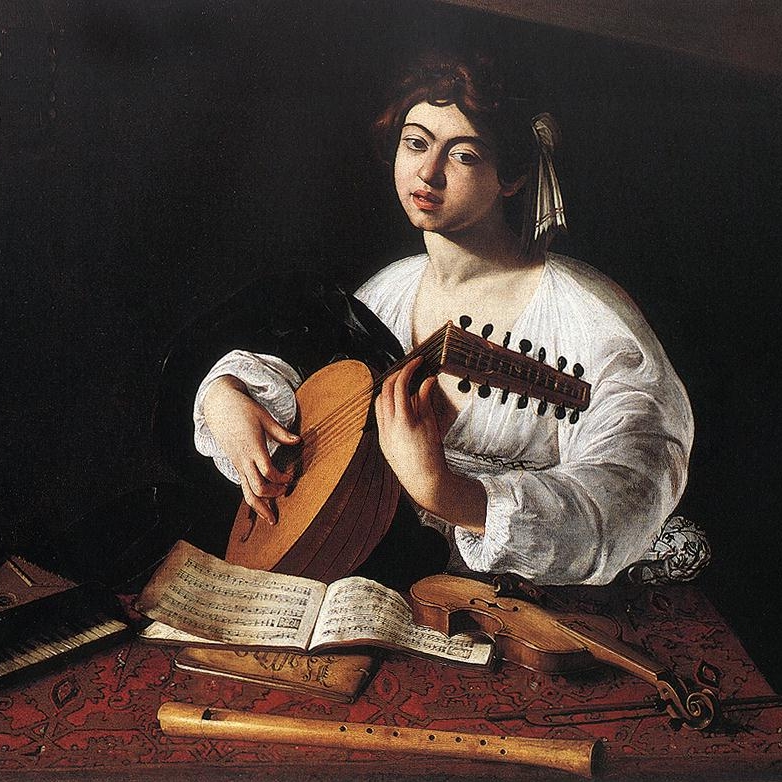In order to preserve the historical integrity of the ballads in this section they are presented in their original dialects, which span a broad range. These ballads have been passed down through the centuries from many different regions of Great Britain before appearing in print. A synopsis of each ballad, in modern American English, is provided to aid in ease of comprehension of the dialects.
Johnie rose up in a May morning,
Called for water to wash his hands:
'Gar loose to me the gude graie dogs,
That are bound wi iron bands.'
When Johnie's mother gat word o that,
Her hands for dule she wrang:
'O Johnie, for my bennison,
To the grenewood dinna gang!
'Eneugh ye hae o the gude wheat-bread,
And enugh o the blude-red wine,
And therefore for nae vennison, Johnie,
I pray ye, stir frae hame.'
But Johnie's buskt up his gude bend bow,
His arrows, ane by ane,
And he has gane to Durrisdeer,
To hunt the dun deer down.
As he came down my Merriemass,
And in by the benty line,
There has he espied a deer lying
Aneath a bush of ling.
Johnie he shot, and the dun deer lap,
And he wounded her on the side,
But atween the water and the brae,
His hounds they laid her pride.
And Johnie has bryttled the deer sae weel
That he's had out her liver and lungs,
And wi these he has feasted his bludey hounds
As if they had been erl's sons.
They eat sae much o the vennison,
And drank sae much o the blude,
That Johnie and a' his bludey hounds
Fell asleep as they had been dead.
And by there came a silly auld carle,
An ill death mote he die!
For he's awa to Hislinton,
Where the Seven Foresters did lie.
'What news, what news, ye gray-headed carle?
What news bring ye to me?'
'I bring nae news,' said the gray-headed carle,
'Save what these eyes did see.
'As I came down by Merriemass,
And down amang the scroggs,
The bonniest childe that ever I saw
Lay sleeping amang his dogs.
'The shirt that was upon his back
Was o the holland fine;
The doublet which was over that
Was o the Lincome twine.
'The buttons that were on his sleeve
Were o the gowd sae gude;
The gude graie hounds he lay amang,
Their mouths were dyed wi blude.'
Then out and spak the first forester,
The heid man ower them a':
If this be Johnie o Breadislee,
Nae nearer will we draw.
But up and spak the sixth forester,
His sister's son was he:
If this be Johnie o Breadislee,
We soon shall gar him die.
The first flight of arrows the foresters shot,
They wounded him on the knee;
And out and spak the seventh forester,
The next will gar him die.
Johnie's set his back against an aik,
his fute against a stane,
And he has slain the Seven Foresters,
He has slain them a' but ane.
He has broke three ribs in that ane's side,
But and his collar bane;
He's laid him twa-fald ower his steed,
Bade him carry the tidings hame.
'O is there na a bonnie bird
Can sing as I can say,
Could flee away to my mother's bower,
And tell to fetch Johnie away?'
The starling flew to his mother's window-stane,
It whistled and it sang,
And aye the ower-word o the tune
Was, Johnie tarries lang!
They made a rod o the hazel-bush,
Another o the slae-thorn tree,
And mony, mony were the men
At fetching our Johnie.
Then out and spake his auld mother,
And fast her teirs did fa;
Ye wad nae be warnd, my son Johnie,
Frae the hunting to bide awa.
'Aft hae I brought to Breadislee
The less gear and the mair,
but I neer brought to Breadislee
What grieved my heart sae sair.
'But wae betyde that silly auld carle,
An ill death shall he die;
For the highest tree on Merriemass
Shall be his morning's fee.'
Now Johnie's gude bend bow is broke,
And his gude graie dogs are slain,
And his bodie lies dead in Durrisdeer,
And his hunting it is done.
The ballad Johnie Cock appears in Volume III of The English and Scottish Popular Ballads, edited by Francis James Child. These volumes are in the public domain.

The Child Ballads are 305 traditional ballads from England and Scotland, and their American variants, anthologized by Francis James Child during the second half of the 19th century. ... Read more at Wikipedia.

Ballads were particularly characteristic of the popular poetry and song of the British Isles from the later medieval period until the 19th century. ... Read more at Wikipedia.